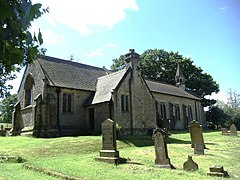Mickley, Northumberland
Villages in Northumberland, England From Wikipedia, the free encyclopedia
Villages in Northumberland, England From Wikipedia, the free encyclopedia
Mickley is a cluster of villages in the civil parish of Prudhoe in Northumberland, England.[1] It lies south of the River Tyne and is accessible via the A695. The electoral ward of Mickley comprises the hamlets of Mickley Square, West Mickley (including Mount Pleasant), High Mickley, plus Cherryburn and Eltringham Farm. The population is a little under one thousand.[2] In 1951 the parish had a population of 1862.[3]
| Mickley | |
|---|---|
 | |
Location within Northumberland | |
| OS grid reference | NZ077620 |
| Civil parish | |
| District | |
| Shire county | |
| Region | |
| Country | England |
| Sovereign state | United Kingdom |
| Post town | STOCKSFIELD |
| Postcode district | NE43 |
| Dialling code | 01661 |
| Police | Northumbria |
| Fire | Northumberland |
| Ambulance | North East |
The Mickley settlements are served by St George's Church, which was built in 1830. Other facilities in Mickley include a garden centre, two social clubs and a cafe on the A695. There is a public house (The Blue Bell Inn), dating from the 1820s, at Mount Pleasant.
The Mickley area is physically situated on a steep, north-facing hill that reaches 203 metres above sea level on Mickley Moor, where views over to both the Simonside Hills and even the Cheviot Hills are often visible on a clear day.
Thomas Bewick, wood-engraver and author of A History of British Birds, the first practical field guide, was born in 1753 at Cherryburn House, just north of Mickley Square. Cherryburn House is now a National Trust site.
There were several collieries in Mickley. Mickley Moor Colliery operated from 1766 till about 1781.[4] Its successor, Mickley Colliery, was just below Mickley Square: it operated from the 1950s until the 1940s.[5] There were also drift mines at West Mickley, and in the woods to the East of Mickley Square.
This village once also produced "Mickley bricks," which can still be found in neighbouring areas. The brick kiln remains at the lower end of Mickley.
Mickley was formerly a township and chapelry in Ovingham parish,[6] from 1866 Mickley was a civil parish in its own right[7] until it was abolished on 1 April 1974 and merged with Prudhoe.[8]
Seamless Wikipedia browsing. On steroids.
Every time you click a link to Wikipedia, Wiktionary or Wikiquote in your browser's search results, it will show the modern Wikiwand interface.
Wikiwand extension is a five stars, simple, with minimum permission required to keep your browsing private, safe and transparent.